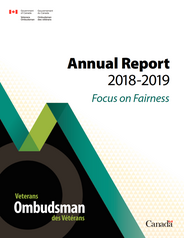Throughout the past year, the Office of the Veterans Ombudsman (OVO) continued its work to advance fairness for Veterans and their families with a particular focus on the issues of wait times; financial security and transition.
As indicated in the 2018-2019 Annual Report report, wait times and the backlog associated with the adjudication of individual claims are the most frequent complaints that the OVO continues to receive from Veterans. Quite simply, this needs to change. Veterans wait far too long for the financial compensation they are due and, perhaps most importantly, the medical treatment they require. The Ombudsman urges Government to take the necessary steps to address this significant and growing problem.
Since the introduction of the Veterans Well-being Act in 2006, there have been five major changes to Veterans’ legislation and 20 benefit programs introduced, modified and/or terminated. This has resulted in three distinct Veteran benefit regimes: the Pension Act; the Veterans Well-being Act; and most recently, Pension for Life. These changes, which were accompanied by considerable government investment, have clearly helped some Veterans and their families.
However, these changes have also resulted in further inequity and complexity for others. Inequity because Veterans with similar injuries are not always treated the same. Complexity because Veterans and their families must navigate a confusing web of legislation, programs and services. These significant changes have occurred without meaningful consultation with Veterans and Canadians and with limited public debate on outcomes. As a result, it is difficult to determine whether or not current programs and services are actually meeting the needs of Veterans.
As 2019-2020 is a year with a new government mandate, the Ombudsman urges Government to engage in meaningful consultation with Canadians in an effort to identify clear Veteran outcomes that over time could inform future changes to Veterans programming and enable the harmonization of the three existing benefit regimes. Doing so would allow addressing existing inequity and reducing complexity. Failing to do so will simply ensure enduring inequity and complexity and not surprisingly, frustration amongst some members of the Veterans' community.
In addition to responding to these and other issues raised by Veterans, the office looks forward to advancing in 2019-2020 the two main priorities which are Women Veterans and Supports for Families.
Source: The Office of the Veterans Ombudsman, Canada

